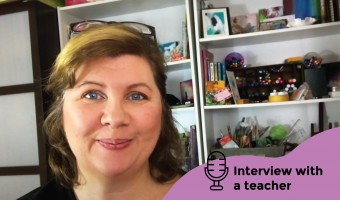Our brain carries our most treasured memories and is our most powerful asset. We should all try to keep it active and sharp. Of course, we can do that by learning something new anytime we can. How? Let’s go over the ways you actually can learn new things everyday, any time.
How science explains the connection between body and mind activities and memory
Exploring new activities allows the brain to make new connections between neurons, creating new neural pathways and allowing electrical impulses to travel faster along them. This allows you to learn more quickly and effectively in the future.

Creating these connections can also improve the plasticity of your brain. Plasticity describes the brain’s ability to change, recover and adapt as a result of new experiences. It allows us to mature from children into adults and recover from brain injuries.
Working to improve your cognitive skills and memory can help you to ward off dementia or Alzheimer’s, reduce stress, improve sleep quality and also boost your concentration span.
There are multiple ways to improve your cognitive skills and enhance your memory abilities without doing algebraic exercises every morning.
You can paint, learn a language, write a blog or even try new foods to keep your brain active.
Why not start now and have fun along the way? You can start today because there is an easy way to learn new things.
Cooking: have fun testing your palate
Cooking involves multitasking, problem solving, organising and staying focussed. Learning about which ingredients complement each other, how to perfectly cook a tender steak and how to save burnt cookies can encourage you to exercise these skills and develop them as a result, preserving cognitive fitness.

You can also learn about superfoods and ‘brain foods’ that you can use in your recipes. For example, dark chocolate and berries can help to improve memory, green vegetables are rich in vitamin K which slows cognitive decline and tea and coffee can help to improve brain function.
Another exercise that is proven to improve memory and cognition is testing your palate. With a friend, close your eyes and try to identify the ingredients or type of food you are eating. This is a fun activity that you can do whilst cooking to help keep your mind active.
Learn new things everyday with quizzes or puzzles: boost a feel-good hormone
Puzzles can increase the blood flow to the brain and also create new connections between neurons. Furthermore, whenever you manage to complete a puzzle or quiz, the brain produces a neurotransmitter known as dopamine. This is known as the ‘feel-good’, pleasure neurotransmitter. However, as well as allowing you to feel rewarded, it can also enhance learning, memory and concentration.
If quizzes or sudoku aren’t your thing, why not try a jigsaw puzzle? Jigsaws can also increase short term memory by exercising both of your brain hemispheres at the same time. The left hemisphere handles logical matters whilst the right hemisphere handles creative matters. Both of these are required to solve jigsaws. Further benefits of jigsaw puzzles include improved attention span and problem solving skills.
Exercise: nourish your body to improve memory
We all know that keeping fit, healthy, toning muscles and improving cardiovascular health is hugely important. However, exercising can also have considerable advantages for brain function and cognitive skills. The increase in heart rate means that more oxygen is delivered to the brain and the release of hormones creates a suitable growth environment for brain cells as well as neural connections. Exercise can also reduce memory loss.
Gardening: grow your garden to enhance memory and learn something new
As well as reducing stress levels and symptoms of anxiety and depression, studies have shown that gardening activities such as tending to a vegetable patch and basic weeding can improve brain nerve growth and improve memory function.
But how?
- Plants release oxygen, helping our brains to function more efficiently.
- It is physical exercise, which releases endorphins
- Improves our sense of purpose and satisfaction to care for something and watch it grow
- We tend to feel more relaxed when surrounded by nature
Learn how to play a musical instrument: develop verbal memory
Whether it is the clarinet, piano, guitar or flute you can have fun developing your literacy skills, verbal memory and spatial reasoning by learning how to play a new instrument.

Research also demonstrates that learning, playing and practicing with the new instrument requires both hemispheres of the brain, which improves memory retention skills. It can also change the structure of your brain, allowing it to function in a better way.
Learn a language: master multitasking
Learning a new foreign language has numerous positive effects on the brain, one of which is the prevention of dementia and Alzheimers. It can also improve the cognitive function and memory of the learner, as the brain becomes attuned to recalling the vocabulary and grammatical structure of two different languages, multitasking and switching between them.
Learning a new language also increases the density of the grey matter in the brain. Grey matter refers to how many cell bodies there are, meaning that those who learn a language have more cells and a consequently healthier brain.
Painting or ceramics: improve hand-eye coordination
Whilst channeling your creativity and expressing yourself, you can also develop your fine motor skills, hand-eye coordination and attention to detail. Artistic activities such as these can also reduce stress levels and serve as downtime so that you can complete your work tasks when you are feeling relaxed and prepared.
Studies have also shown that those who frequently paint, draw or make ceramics have a lower probability of developing a memory loss illness in later life. Interestingly, merely engaging with visual arts can improve memory, empathy and the resilience of the brain.
Origami: enhance motor skills and have fun
This intricate art that can produce beautiful paper roses and swans can hugely benefit your brain in terms of memory and cognition. This is because it involves following instructions and complex, tactile use of the hands, which stimulates various regions of the brain. This also allows the development of hand-eye coordination, 3D comprehension and concentration. Once our hands become actively engaged, impulses are repeatedly sent to both the left and the right hemisphere of the brain.

The numerous benefits for brain function, memory, cognitive fitness and motor skills is the reason for which origami is frequently used in therapeutic settings and even for injury or stroke rehabilitation.
Blogging: stay mentally active
Blogging requires research, learning, organising, creativity and communication skills in order to write a successful piece that will resonate with the audience. You may also have to endure a bit of the dreaded multitasking if you are writing a number of blog posts. All of these skills and concepts help to improve your memory and brain function.
Researching statistics and studies specific to your topic, learning to organise your thoughts into a coherent piece with subheadings and staying mentally active by writing engaging posts are all aspects of lifelong or continuous learning, which can improve the plasticity of your brain.
Writing poetry: stimulate your imagination
Writing poetry and listening to music have similar effects on the brain. Studies involving MRI scans have shown that these activities stimulate the right hemisphere of the brain, particularly in regions related to emotion and satisfaction.
Stimulating your imagination, thinking about which words to rhyme, structuring your piece and the rewarding feelings of pride that occur when you finish a piece all help to develop your brain in various ways. It can also stimulate self-reflection and introspection and allow you to express your emotions in a way that can resonate and connect with others. These complex, emotional aspects of poetry result in improved cognition and brain function.
Reading: keep the brain active
Reading strengthens your brain. It stimulates you mentally, expands your vocabulary, allows you to sleep better and also enhances your social skills.
Studies show that reading requires more from the brain than deciphering speech, and involves visual, linguistic and associative learning, which can help to improve your memory. Furthermore, scientists at the University of California found that reading lowers the levels of the brain protein ‘beta-amyloid’ which is involved in Alzheimers, as it keeps the brain active.

Finally, it can also enhance the connectivity in your brain as well as its overall ability to function. By exercising your imagination, emotions and your ability to put yourself in the position of various characters, the resting connectivity of your brain can drastically improve.
Visit new places: stimulate creativity and imagination
Zoos, museums, art galleries and various historical sites can stimulate the mind in many ways and allow you to learn new, interesting facts about concepts you may not have explored in the past.
Whilst this isn’t a conventional ‘craft’ as such, it is an activity that stimulates creativity and lifelong learning, therefore aiding with memory and cognitive fitness. Read the signs and the information that surrounds you in these areas, rather than passively observing the animals or paintings.
Keeping your brain active and learning new things is indispensable when it comes to fending off Alzheimers and dementia, creating new connections in the brain, preventing the loss of memory, brain plasticity and cognitive function. This is a fun activity that you can do with friends or like minded people whilst also exercising your brain.
To sum up!
These are just some of the many crafts and activities that you can begin to help improve your cognitive skills and memory.
Who wouldn’t want better resting brain connectivity, improved plasticity, more connections and neural pathways in the brain, better long term memory and denser grey matter in the brain? The benefits are endless.
It could be as simple as trying out a new recipe, adding to your new blog or lifting some weights in the gym. Not everything which improves your brain function has to involve a calculator or a complex formula. It is very important to keep your brain active and learn new things everyday as much as possible in order to strengthen your brain at present as well as fending off heartbreaking conditions such as dementia in later life.
Whether you are looking to strengthen your brain for school, your career or your future, you can start small today, and enjoy trying a new activity while doing so. You could even meet some new friends along the way.





Comments